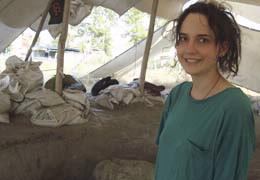The home of Australia’s nuclear science and technical expertise opened its doors this week to inspire the next generation of scientists from across Australia and New Zealand.
The visitors were asked to imagine having a job where every few months you get to go down to Cronulla and catch fish, or work in a state-of-the-art measurement centre that puts CSI-style science at your fingertips.
Every day, scientists at the Australian Nuclear Science and Technology Organisation (ANSTO) investigate some of the most interesting and important questions society faces in areas such as health and industry.
ANSTO operates much of our country’s landmark science facilities including one of the world’s most modern nuclear research reactors - OPAL, the Australian Synchrotron and the National Imaging Facility Research Cyclotron.
These facilities are capable of solving some of the world’s most complex problems, but are only as good as the scientists charged to run them. To inspire the next budding group of scientists who will take on the world, ANSTO hosted university students from across Australia and New Zealand.
 |
| The AINSE Winter School offers students the chance to tour ANSTO, home to most of Australia's landmark science facilities. From left: Materials scientist Ken Short giving a big picture view into some the work being done at ANSTO to predict the behaviour of materials following radiation damage; Scientist Patrica Gadd demonstrating ITRAX - a core sediment and tree ring instrument that's helping scientists better understand the history of Earth's climate; and scientific support officer Rob Aughterson discussing TEM characterisation techniques used in describing a range of samples, including radiation damaged materials. |
Visit our Facebook page to see more photos from the AINSE Winter School.
Each year, the Australian Institute of Nuclear Science and Engineering (AINSE) offers scholarships to each of its member universities to enable a nominated student to attend Winter Schools at ANSTO’s Lucas Heights campus in Sydney’s Sutherland Shire. This year the school was on Applications of Nuclear Techniques Applied to Natural Processes.
The scholarship is open to all senior undergraduate students in nuclear analysis techniques. Such techniques have applications in areas ranging from agriculture to zoology, and include physics, chemistry, biology, environmental science, geography, geology, archaeology.
The Winter School involves a mixture of lectures, experimental sessions and demonstrations and includes hands-on experience in experiments.
This year’s group of students met with some of ANSTO’s leading scientists and saw firsthand the work being done in the fields of neutron, environmental and materials science, as well as engineering.
 |
| University of Queensland student Stephanie Anna Florin, seen here on an excavating dig at Boncuklu Höyük in central Anatolia, Turkey, attended the 2012 Winter School and received AINSE funding to use AMS radiocarbon dating techniques to learn about how early Aboriginal peoples lived. |
Interested students are then given the chance to pursue further studies at ANSTO, with scholarships offered to conduct research. Among last year’s group of Winter School students, Stephanie Anna Florin from the University of Queensland received funding to AMS radiocarbon date her honours research into the subsistence practices of the Aboriginal peoples inhabiting a site in Arnhem Land (Northern Territory) for over 45,000 years.
Anna’s work, as an archaeobotanist, studying the charred remains of fruits, nuts, seeds and ‘root’ foods excavated from the rock shelter site Madjedbebe (Malakanunja II) is helping researchers better understand how early Aboriginal Australians were adapting to and using their environment over thousands of years.


